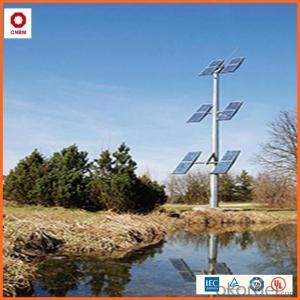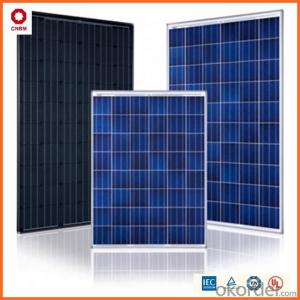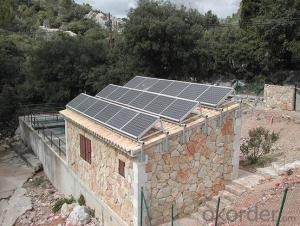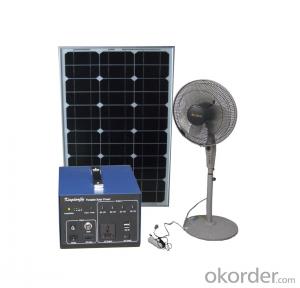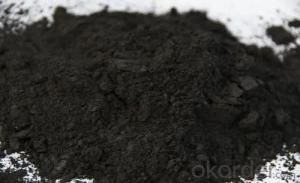!!! Hot On Sale!!! Stock Small Solar Panel 50w Poly with Good Quality
- Loading Port:
- China main port
- Payment Terms:
- TT OR LC
- Min Order Qty:
- 1 watt
- Supply Capability:
- 10000000 watt/month
OKorder Service Pledge
OKorder Financial Service
You Might Also Like
Product Description:
Hot Sale !!! Quality and Safety of Small Poly Solar Panel 35~85w
1. Rigorous quality control meets the highest international standards.
2. High-transmissivity low-iron tempered glass, strong aluminium frame.
3. Using UV-resistant silicon.
4. IS09001/14001/CE/TUV/UL
Warranties of Small Poly Solar Panel 35~85w
1. 10 years limited product warranty
2. 15 years at 90% of the minimal rated power output
3. 25 years at 80% of the minimal rated power output
Technical date of 45w-85w Poly Solar Panel
ITEM NO.: | Mono 125*125 cell ,36pcs . Power range from 80Wp-100Wp | ||||||||
Maximum Power(W) | 80 | 85 | 90 | 95 | 100 | ||||
Optimum Power Voltage(Vmp) | 17.81 | 17.89 | 17.94 | 17.99 | 18.06 | ||||
Optimum Operatige Current(Imp) | 4.78 | 4.91 | 5.12 | 5.35 | 5.59 | ||||
Open Circuit Voltage(Voc) | 21.98 | 22.05 | 22.14 | 22.28 | 22.45 | ||||
Short Circuit Current(Isc) | 4.95 | 5.15 | 5.36 | 5.65 | 5.84 | ||||
Solar Cell: | 125*125 Mono | ||||||||
Number of Cell(pcs) | 4*9 | ||||||||
Brand Name of Solar Cells | JA Cell, Bluesun Cell | ||||||||
Size of Module(mm) | 1580*808*35 | ||||||||
Caple & Connector Type | Pass the TUV Certificate | ||||||||
Frame(Material Corners,etc.) | Aluminium-alloy | ||||||||
Backing (Brand Type) | TPT | ||||||||
Cell Efficiency for 100W(%) | 15.8% | ||||||||
Weight Per Piece(KG) | 12.0KG | ||||||||
FF (%) | 70-76% | ||||||||
Junction Box Type | Pass the TUV Certificate | ||||||||
Tolerance Wattage(e.g.+/-5%) | ±3%, or 0-3% | ||||||||
Front Glass Thikness(mm) | 3.2 | ||||||||
Temperature Coefficients of Isc(%) | +0.04 | ||||||||
Temperature Coefficients of Voc(%) | -0.38 | ||||||||
Temperature Coefficients of Pm(%) | -0.47 | ||||||||
Temperature Coefficients of Im(%) | +0.04 | ||||||||
Temperature Coefficients of Vm(%) | -0.38 | ||||||||
Temperature Range | -40°C to +85°C | ||||||||
Surface Maximum Load Capacity | 2400Pa | ||||||||
Allowable Hail Load | 23m/s ,7.53g | ||||||||
Bypass Diode Rating(A) | 12 | ||||||||
Warranty | 90% of 10 years,80% of 25 years. | ||||||||
Standard Test Conditions | AM1.5 1000W/ 25 +/-2°C | ||||||||
Packing | carton or pallet | ||||||||
1*20' | 25 Pallets / 450pcs | ||||||||
1*40'STD | 25 Pallets / 100pcs | ||||||||
Features of our products:
• High conversion efficiency mono/poly-crystalline amorphous silicon solar cells
• Modules incorporate high performance bypass diodes to minimize the power drop caused by shading
• High transmittance, low-iron tempered glass
• High performance EVA encapsulant to prevent destroying and water.
• AI frame: without screw, corner connection. 8 holes on the frame can be installed easily
• Good performance of preventing from atrocious weather such as wind and hails
• Certifications: CE IEC TUV VDE UL, Class I
• 10 years 90% power output warranty

Shipping of Small Poly Solar Panel 35~85w
By Sea | Delivery from Shanghai or Ningbo seaport |
By Air | Departure from Shanghai Pudong Airport |
By Express | Post by DHL, EMS, UPS, TNT. |
- Q:Are there any risks of electrical grounding issues with solar energy systems?
- Yes, there are some risks of electrical grounding issues with solar energy systems. One of the main risks is the potential for electric shock. If the grounding system in a solar energy system is not properly installed or maintained, it can lead to a build-up of electrical current in the system. This can result in a person coming into contact with a live electrical component and experiencing an electric shock. Another risk is the potential for fire. If the grounding system is not properly installed, it can cause electrical arcing, which can lead to a fire. This is particularly dangerous in solar energy systems as they are typically installed on rooftops, where a fire can quickly spread to the rest of the building. Additionally, a faulty grounding system can also lead to damage to the solar energy system itself. Without proper grounding, electrical surges and fluctuations can occur, which can damage sensitive components of the system, such as inverters or batteries. To mitigate these risks, it is crucial to ensure that the grounding system of a solar energy system is properly installed and regularly inspected and maintained. This includes using proper grounding equipment, such as grounding rods or conductors, and ensuring that all connections are secure and free from corrosion. Regular testing of the grounding system should also be conducted to ensure its effectiveness. It is recommended to hire a qualified professional to install and maintain the grounding system to minimize the risks associated with electrical grounding issues in solar energy systems.
- Q:Can solar energy systems be used for powering electric car wash systems?
- Yes, solar energy systems can indeed be used to power electric car wash systems. By installing solar panels, the energy from the sun can be harnessed and converted into electricity to power the car wash equipment. This renewable energy source offers an eco-friendly and sustainable alternative to traditional electricity sources.
- Q:Can a solar energy system be installed in a coastal area?
- Yes, a solar energy system can be installed in a coastal area. In fact, coastal areas can be ideal for solar installations due to the abundance of sunshine and the potential for strong winds, which can help keep the solar panels cool and increase their efficiency. However, it's important to consider the potential impact of saltwater corrosion on the system's components and to use appropriate materials and maintenance practices to ensure its longevity.
- Q:Can solar energy systems be used for powering greenhouses?
- Yes, solar energy systems can definitely be used for powering greenhouses. Solar panels can be installed on the roof or walls of a greenhouse to capture sunlight and convert it into electricity. This renewable energy can then be used to power various systems within the greenhouse, such as ventilation, heating, cooling, and lighting. Solar energy offers several advantages for powering greenhouses. Firstly, it is a clean and sustainable source of energy, which helps reduce greenhouse gas emissions and environmental impact. Secondly, solar power is reliable and abundant, especially in regions with ample sunlight. This means that greenhouses can have a consistent and uninterrupted power supply, even in remote or off-grid locations. Additionally, solar energy systems can help reduce operating costs for greenhouse owners. Once the initial investment in solar panels and equipment is made, the ongoing energy costs are significantly lower compared to traditional fossil fuel-based systems. This can lead to substantial long-term savings, especially for larger-scale commercial greenhouses. Moreover, solar energy systems can be integrated with energy storage solutions, such as batteries, to store excess energy generated during the day. This stored energy can then be used during cloudy periods or at night, ensuring a continuous power supply for the greenhouse. Overall, solar energy systems are a viable and sustainable option for powering greenhouses. They offer numerous benefits, including reduced environmental impact, reliable energy supply, cost savings, and the ability to integrate with energy storage solutions.
- Q:Are there any risks of electrical malfunctions or failures during extreme weather events with solar energy systems?
- Yes, there are some risks of electrical malfunctions or failures during extreme weather events with solar energy systems. Severe weather conditions such as hurricanes, tornadoes, hailstorms, or heavy snowfall can potentially damage solar panels, inverters, or electrical wiring, leading to system failures. Additionally, lightning strikes can pose a risk to solar energy systems, potentially causing damage or complete failure. However, proper installation, regular maintenance, and adhering to industry standards can help mitigate these risks and ensure the resilience of solar energy systems during extreme weather events.
- Q:Can solar energy systems be used for powering hotels?
- Hotels can definitely use solar energy systems to power their operations. In fact, many hotels worldwide are already utilizing solar power to fulfill their energy requirements. Solar energy systems, such as PV panels or solar thermal systems, can be installed on hotel rooftops or surrounding land to capture the sun's power and convert it into electricity or heat. Solar power offers numerous advantages for hotels. Firstly, it is a clean and sustainable energy source, contributing to reduced carbon footprints and promoting sustainable practices. By utilizing solar energy, hotels can significantly decrease their dependence on fossil fuels and lower greenhouse gas emissions. Secondly, solar energy systems provide hotels with energy independence and reduce reliance on the grid. This is especially beneficial in remote areas or during power outages, as hotels can seamlessly continue operations with their own power supply. Additionally, surplus energy generated by solar panels can be stored in batteries for use during nights or cloudy days. Moreover, installing solar panels can be a wise financial decision for hotels. While initial installation costs may be high, solar energy systems have long lifespans and can result in substantial savings on electricity bills over time. In certain cases, hotels can even sell excess energy back to the grid, generating additional revenue. Lastly, solar power can enhance a hotel's reputation and attract environmentally-conscious guests. Many travelers actively seek eco-friendly accommodation options, and hotels utilizing solar energy can position themselves as sustainable and socially responsible. In conclusion, solar energy systems can certainly power hotels, offering clean, renewable, and cost-effective energy sources. They provide energy independence, financial benefits, and enhance a hotel's reputation. As the world moves towards a more sustainable future, solar power has become an increasingly popular choice for hotels seeking to minimize their environmental impact and efficiently meet their energy needs.
- Q:Can solar energy systems be used in powering scientific research vessels or marine laboratories?
- Yes, solar energy systems can definitely be used to power scientific research vessels or marine laboratories. Solar energy is a renewable and sustainable source of power that can be harnessed using photovoltaic panels or solar thermal collectors. Research vessels and marine laboratories require a significant amount of energy to carry out their operations, which often includes scientific experiments, data collection, and analysis. These activities typically involve equipment such as computers, sensors, and lab instruments that require a constant and reliable source of power. Solar energy systems can be installed on these vessels or laboratories to provide a clean and efficient source of electricity. The photovoltaic panels convert sunlight into electricity, which can then be used to power the various equipment and systems onboard. Additionally, excess energy produced by the solar panels can be stored in batteries for use during periods of low sunlight or at night. Utilizing solar energy in these marine environments offers several advantages. First, it reduces the dependence on fossil fuels and minimizes the carbon footprint associated with traditional power generation methods. This is especially important in the context of scientific research, as it aligns with the principles of environmental sustainability and conservation. Second, solar energy systems provide a reliable and independent source of power. Research vessels and marine laboratories often operate in remote or isolated locations where access to traditional power grids may be limited or non-existent. By utilizing solar energy, these vessels and facilities can generate their own electricity and continue their research activities without relying on external power sources. Finally, solar energy systems are low-maintenance and have a long lifespan. Once installed, they require minimal upkeep and can withstand the harsh marine environment. This makes them well-suited for use in research vessels or marine laboratories, where downtime and maintenance issues can be disruptive to ongoing scientific projects. In conclusion, solar energy systems can certainly be used to power scientific research vessels or marine laboratories. They offer a sustainable, reliable, and independent source of electricity, reducing the carbon footprint and ensuring uninterrupted research activities even in remote locations.
- Q:Are there any noise concerns associated with solar energy systems?
- Noise concerns may arise when using solar energy systems, though they are generally quiet. One of the main sources of noise is the inverter, which converts DC electricity from the panels into AC electricity for use. The inverter may emit a low humming noise, similar to that of a fridge or AC unit. However, the noise level is typically very low and not considered disruptive. Fortunately, advancements in technology have led to the development of quieter inverters that produce minimal noise. Some inverters have noise reduction features like soundproof enclosures or low-noise fans. Additionally, the location of the inverter can help minimize noise concerns. Placing it in a well-insulated area, away from living spaces, can further reduce potential noise disturbances. It's important to note that other components of a solar energy system, such as mounting structures and wiring, do not generate significant noise. Solar panels themselves are noiseless as they rely on sunlight for electricity generation, without any moving parts. In conclusion, while certain components of solar energy systems may have noise concerns, advancements in technology and proper installation practices have greatly reduced potential disruptions.
- Q:How do solar energy systems impact job training and skill development?
- Solar energy systems impact job training and skill development by creating a demand for skilled workers in the renewable energy industry. As the solar industry continues to grow, there is a need for individuals with expertise in installation, maintenance, and repair of solar panels and other related equipment. This demand for skilled workers provides an opportunity for job training programs to develop and offer courses that equip individuals with the necessary skills to enter the solar energy workforce. Consequently, solar energy systems contribute to job creation and skill development in the green energy sector.
- Q:Are solar energy systems expensive to install?
- Solar energy systems can be initially expensive to install, but they offer long-term cost savings and potential return on investment through reduced energy bills and government incentives.
1. Manufacturer Overview |
|
|---|---|
| Location | |
| Year Established | |
| Annual Output Value | |
| Main Markets | |
| Company Certifications | |
2. Manufacturer Certificates |
|
|---|---|
| a) Certification Name | |
| Range | |
| Reference | |
| Validity Period | |
3. Manufacturer Capability |
|
|---|---|
| a)Trade Capacity | |
| Nearest Port | |
| Export Percentage | |
| No.of Employees in Trade Department | |
| Language Spoken: | |
| b)Factory Information | |
| Factory Size: | |
| No. of Production Lines | |
| Contract Manufacturing | |
| Product Price Range | |
Send your message to us
!!! Hot On Sale!!! Stock Small Solar Panel 50w Poly with Good Quality
- Loading Port:
- China main port
- Payment Terms:
- TT OR LC
- Min Order Qty:
- 1 watt
- Supply Capability:
- 10000000 watt/month
OKorder Service Pledge
OKorder Financial Service
Similar products
New products
Hot products
Hot Searches
Related keywords
